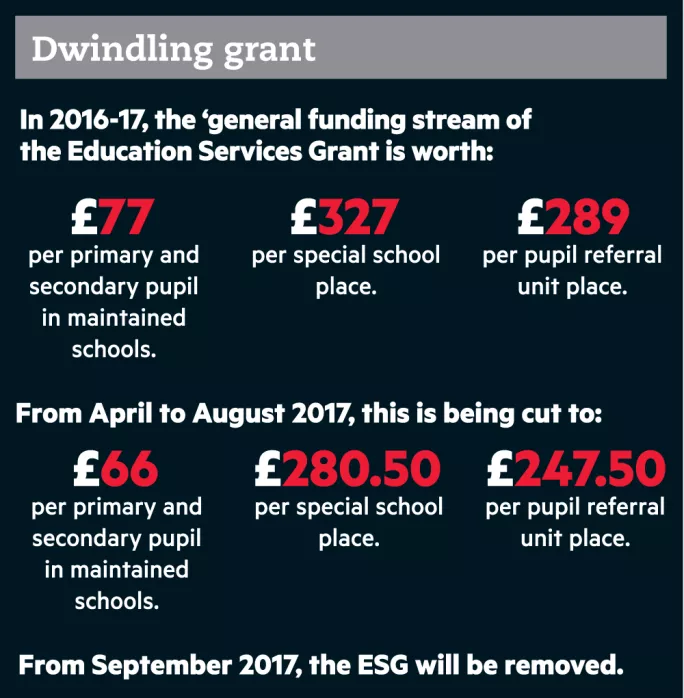Heads rail at ‘disastrous’ levy to plug funding gap

Schools are set to be hit by a “disastrous” levy as councils search for ways to replace a £600 million government funding pot being dropped from September.
Surrey County Council is proposing an annual levy on maintained schools to fund areas such as building projects, redundancies, pensions and curriculum assessments, TES can reveal. The levy would be worth around £60 per pupil each year, made up of £25.89 per pupil from September 2017, plus an additional £35.34 per pupil to subsidise music and performing arts services.
The money would pay for areas currently funded by the Education Services Grant (ESG), which the government is reducing from April and cutting altogether from September.
However, a paper from a Surrey school forum meeting on 7 December, published last week, asks members whether they wish to subsidise music and performing arts, “as this is a non-statutory service”.
The paper also states: “The DfE is not making any additional funding available to schools to fund the levy, so the levy represents an effective cut to school budgets.”
Surrey is also proposing that its schools set aside a further £10.91 per pupil to pay for school improvement services. The average maintained secondary school in the area would pay £52,625 for the levy and a further £21,339 for school improvement services.
In November, the government said that it was allocating £50 million a year for school improvement funding, as well as establishing a £140 million “strategic school improvement fund’, from September 2017.
However, schools are facing severe financial pressures, largely due to rising workforce costs and real-terms funding cuts.
Valentine Mulholland, head of policy at the NAHT heads’ union said: “Although [the levy] will rely on the support of schools forums…this is a significant additional cost and not something schools will have factored in.
“With the additional cost of the apprenticeship levy from April, it’s disastrous. The £600 million of savings in ESG will just be taken out of school funding.”
Malcolm Trobe, interim general secretary of the Association of School and College Leaders warned that other local authorities around the country were working on similar arrangements. “The schools can’t afford to give up any money at the moment,” he said. “I understand that the local authorities are strapped for cash as well, but…they have to rise to the challenge without imposing on schools that are very hard-pressed.”
A Surrey County Council spokeswoman said: “This has hit us all very hard, including academies, as we have had our money taken away at a time when we are facing huge financial pressures, so we have every sympathy.”

Raiding reserves
A Department for Education document, published in November, said that the government would amend regulations to allow local authorities to “retain some of their schools block funding to cover the statutory duties they carry out for maintained schools, which were previously funded through the ESG”.
The amount would need to be agreed by the maintained school members of school forums, but if no agreement could be reached, the matter would be referred to the education secretary. Academies are unaffected by the proposal.
Rather than raising a levy, some councils plan to plug the ESG shortfall by raiding their reserves or underspends from previous years.
Oxfordshire has suggested using £804,000 available from funding left over from its 2012-13 Dedicated Schools Grant budget. But this is far less than the annual £3.2 million of ESG funding that the council has received in recent years.
Derbyshire County Council receives £8.3 million from the ESG. In a paper from a 10 November meeting, it proposes partly filling this gap by using £2.3 million of council reserves in 2017-18.
But the paper also highlights the need to retain some reserves for “possible transitional support for schools which lose resources under the national funding formula”.
For the first year of the formula, funding will still be passed to schools via local authorities, but from 2019-20, it will bypass councils.
You need a Tes subscription to read this article
Subscribe now to read this article and get other subscriber-only content:
- Unlimited access to all Tes magazine content
- Exclusive subscriber-only stories
- Award-winning email newsletters
Already a subscriber? Log in
You need a subscription to read this article
Subscribe now to read this article and get other subscriber-only content, including:
- Unlimited access to all Tes magazine content
- Exclusive subscriber-only stories
- Award-winning email newsletters